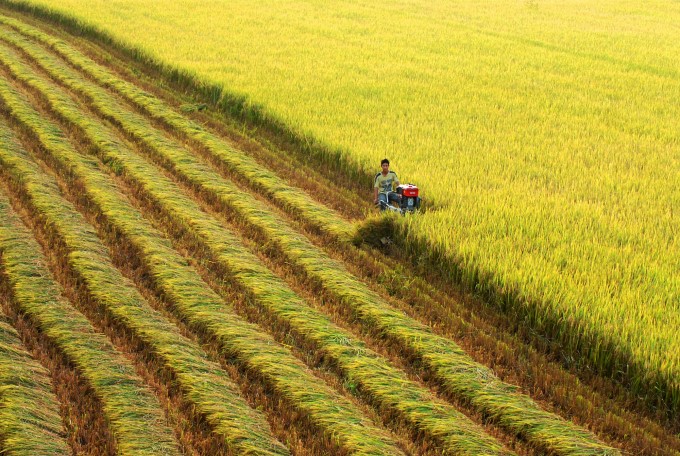June 15, 2025 | 20:27 GMT +7
June 15, 2025 | 20:27 GMT +7
Hotline: 0913.378.918
June 15, 2025 | 20:27 GMT +7
Hotline: 0913.378.918
Regarding the rice land issue, Mr. Le Minh Hoan shared the story of visiting the farmer who wrote a letter to the Prime Minister asking to support rice growers to ensure a 30% profit. That farmer told Mr. Le Minh Hoan: “If growing rice can make a profit, farmers are willing to bring mosquito nets and mats out to sleep in the fields to ensure food security, but if the profit is this low, we will leave the fields, leave the food security problem to the Government”.
"That story is worth thinking about our will and the reality of social life," said Mr. Le Minh Hoan.

The food security issue is not just about rice.
Next is about food security. Previously identified as rice, but now the world has a broader definition, including food and the replacement of other nutrients, not just rice, so ensuring the goal of keeping the rice land is one thing, how the crops are grown on it is another thing which needs to be discussed to reposition.
"Restructuring agriculture in the new period is not to increase this area, reduce that area, but to organize the transformation of models and mindset to increase added value in agriculture", reaffirmed Minister Le Minh Hoan.
Mr. Tran Tuan Anh highly appreciated the efforts of the Ministry of Agriculture and Rural Development in organizing the implementation of the task of summarizing Resolution 19-NQ/TW and preparing for the review of Resolution 26-NQ/TW. The results of the exchange and discussion at this meeting are the initial important contents that need to continue to be thoroughly studied to complete the summary content and finalize the final report to submit to the Central Committee.
Mr. Tran Tuan Anh requested that the review organizing must be conducted scientifically, closely followed reality, properly assessed the implementation situation of the Resolution and set out appropriate orientations and solutions.
This will also help the Steering Committee supplement important ideas and contents in a number of issues in developing a new Resolution on land and a new Resolution on agriculture, farmers and rural areas; suggesting guidelines, orientations and solutions in the new era, with the goal of turning land resources, especially agricultural land, into a new resource and driving force to promote a faster and more sustainable development on our country’s agriculture, economy and rural society.
As for the summarize of Resolution 19-NQ/TW, the reality from the land sector is very diverse, many new issues need to be considered and resolved, which requires a unified, scientific, urgent direction and study, especially when facing request on the time to complete and submit to the Central Committee in early October 2021, while the time to complete the summary content is not much, even affected by the Covid-19 pandemic, making it very difficult to organize the implementation of the task of summarizing this Resolution.
The preparation for the review of Resolution 26-NQ/TW on agriculture, farmers and rural areas also requires to be very urgent and scientific. The situation demands the Ministry of Agriculture and Rural Development and related agencies to make efforts with great determination to be able to successfully complete this important task.

(VAN) The UNESCO Global Geopark revalidation of Non nuoc Cao Bang and the transition to a two-tier administrative model are presently undergoing a pivotal moment in Cao Bang, the northernmost province of Vietnam.
/2025/06/13/5330-2-004539_953.jpg)
(VAN) Changing policy mindset and removing investment barriers are urgent requirements to open up new development space for enterprises in the agricultural sector.

(VAN) The areas include the restoration of five million hectares of marine ecosystems.

(VAN) Dr. Le Van Nguyen, Director of the Institute of E-Commerce Management (ECM), emphasizes the potential for green development through the cultivation of fruit trees, particularly in provinces such as Son La.

(VAN) VAAS and numerous Vietnamese enterprises have signed cooperation agreements with Japanese partners to promote agricultural technology and trade connectivity.
/2025/05/29/5625-12-214801_567.jpg)
(VAN) Provincial mergers in the Mekong Delta promise to streamline administration, expand inter-provincial raw material areas, and foster close linkages in agricultural value chains, benefiting both businesses and cooperatives.

(VAN) Merging Mekong Delta provinces contributes to the expansion of agricultural raw material areas, addressing previous constraints caused by provincial boundaries. Additionally, this expansion will reduce costs and strengthen linkages between businesses, cooperatives, and farmers.